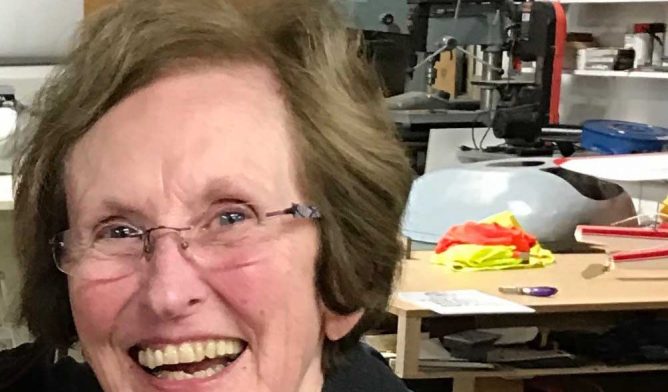Immunotherapy Works Wonders for Mesothelioma Survivor
Stories from SurvivorsWritten by Tim Povtak | Edited By Walter Pacheco

Almost a year after chemotherapy had failed – and the end looked near – Barbara Lappala was happily hosting another big family gathering, savoring the sockeye salmon and sautéed sea scallops she loves so much.
Thank God for immunotherapy treatment.
Dinner was served.
Lappala, 79, is a pleural mesothelioma survivor who is beating the odds with a stunning recovery that has amazed her doctors and rekindled her full-speed-ahead attitude.
“I tell people today, I’m a walking miracle,” Lappala said. “They don’t believe in miracles. Then they see me.”
Lappala lives alone near Anchorage, Alaska, but she rarely is alone, volunteering at the local Senior Center and Food Bank, active in her church, hosting family dinners, taking brisk walks and cruising the grocery-store aisles.
“I feel fantastic, better now than I have in quite a while,” she told The Mesothelioma Center at Asbestos.com. “There’s nothing I can’t do. I’m not restricted in any way. I like staying active, keeping busy.”
Keytruda Was Key to Recovery
Lappala attributes her miraculous turnaround to Keytruda (pembrolizumab), an immunotherapy drug she receives systemically every three weeks.
She drives herself to the clinic, typically stopping to shop on the way home.
Although Keytruda has shown some effectiveness with several cancers, it only works this well for a small percentage of patients, supercharging the immune system to fight off tumor cells.
The FDA has not approved it yet for the treatment of pleural mesothelioma – its effectiveness is not typically sustainable — but Lappala and others can obtain it through a Special Access program that oncologists are using now.
“Keytruda, it has worked like a charm for me, although I’m not exactly sure why,” Lappala said. “There have been absolutely no side effects. For me, it’s the magic bullet.”
Lappala was originally diagnosed in May 2018 with mesothelioma, a stunning revelation for someone who never heard of the disease nor worked anywhere near asbestos, the primary cause of the cancer.
“I was shocked when they explained it. Then came denial. I kept saying, ‘There has to be a mistake, or something got mixed up in the lab.’ It’s like you’ve been given the black card,” Lappala said. “Then they told me the options, and there weren’t many of those. It was ‘chemo or you won’t be around very long.’”
Chemotherapy Failed Her
She started chemotherapy sessions in June, and the side effects were debilitating. After three months of chemotherapy, she had lost more than 25 pounds.
“If you’re eating cardboard — and that’s how the food tasted during chemo — you won’t show up the next day for dinner,” she said. “Food is my life, but I was a walking bag of bones, down to 97 pounds.”
Even worse were the CT scan results, which showed the chemotherapy had not stopped or slowed the cancer from spreading.
Surgery wasn’t an option. She was too old, and her type of mesothelioma had spread too far, moving from the lining around the lungs and into the abdomen.
“They thought I’d be gone before last Christmas,” she said. “I was so tired from the chemo, just worn out. You know, we’re all going to die. It’s a given. And I figured maybe my time had come.”
Family Support Was Critical
Then she thought about the family, her three children, their spouses, the five grandchildren, three great grandchildren and two more of them on the way.
The thought of them filling her house for another family gathering gave her strength. When her oncologist first suggested Keytruda, she hesitated.
“She really didn’t want to do it at first, but we convinced her to give it a shot. She had nothing to lose. She begrudgingly decided yes, and it was the greatest decision she has made,” said daughter-in-law Kim Jackson. “She took to Keytruda like a duck to water.”
Lappala credits that family support and her faith in God for playing a major role in becoming an inspiration to many. The diagnosis had helped sharpen her perspective on life.
“It brings you to a certain point, where you realize what’s really important to you. I do savor a lot of stuff now that wasn’t as important to me before,” she said. “It brings you closer to reality, real reality.”
Lappala isn’t the first pleural mesothelioma patient to discover just how effective the Keytruda treatment can be, only the latest example.
Randy Boudreaux, from Carriere, Mississippi, made a remarkable turnaround in 2018 after chemotherapy failed him, and he started taking Keytruda.
Walter Merth, a mesothelioma survivor from Philadelphia, credits Keytruda for his postsurgery comeback and his longevity today.
“I don’t know what percentage of people it works for, but I just feel like I’ve been blessed with what I’ve been given, and that’s extra time,” Lappala said. “I hope to make good use of it.”
Last week’s big family gathering was a perfect example. Among the attendees was Riley, her 3-month-old great granddaughter from Portland whom she held for the first time. The moment was priceless.
“These kinds of things are so important to me now,” she said. “It’s why I wasn’t ready to cash in my chips. I had a lot of life left to live. I was tired from the chemo, but I wanted to give it one more try. I’d encourage others to do the same.”




